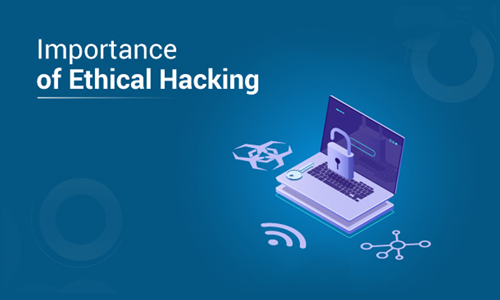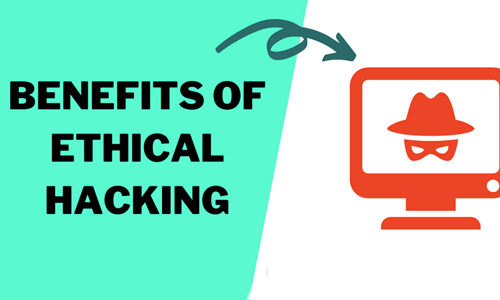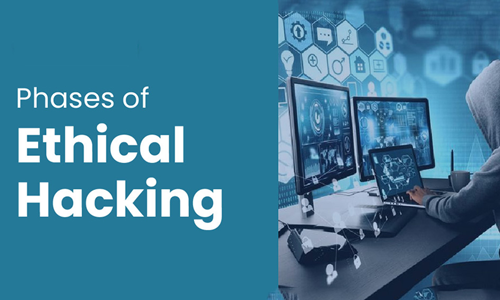What is Ethical Hacking?

Ethical hacking is the process of testing a computer system for security vulnerabilities. This is done to identify if the system is vulnerable to attack. There are several types of hacking, but the most common type is called "penetration testing." It involves a hacker trying to gain unauthorized access to a computer system that they do not own. Penetration testing may be carried out by anyone with basic computer knowledge and the right tools.
Importance of Ethical Hacking?

Ethical hacking is a part of ethical hacking that helps companies and organizations to achieve their business goals and objectives. Some of the main reasons why ethical hackers are important are as follows:
• To determine the security posture of the organization or network by testing its vulnerabilities.
• To understand the nature of the threat, how it can be exploited, how it can be defended against, and how to minimize potential losses.
• To gather information about different attacks, methods used, and their impact on the organization/network. This knowledge helps in improving security posture or better understanding of existing security threats.
• To identify vulnerabilities in IT infrastructure, application, system, and network environments. This information helps improve security posture or better understand existing security threats. It also helps in developing plans for mitigating these threats to protect the organization from any possible damages caused by these threats.
• To develop a plan to fix security vulnerabilities and provide recommendations.
• To test the effectiveness of security solutions and tools provided by an organization or vendor. This helps in ensuring that the security is not just a hype.
• To identify possible threats, vulnerabilities, and weaknesses in IT infrastructure, application, system, and network environments. This helps in improving security posture or better understanding of existing security threats. It also helps develop plans to mitigate these threats to protect the organization from any possible damages caused by these threats.
Benefits of Ethical Hacking?

Here are some of the advantages of ethical hacking:
• It helps in understanding the nature of threats and vulnerabilities.
• Helps in improving security posture or better understanding of existing security threats. It also helps develop plans to mitigate these threats to protect the organization from any possible damages caused by these threats.
• Helps develop a plan to fix security vulnerabilities and provide recommendations for the same.
• It helps assess the effectiveness of security solutions and tools provided by an organization or vendor. This helps in ensuring that the security is not just a hype.
Types of Ethical Hacking?
There are two types of ethical hacking:
• White-box hacking: In this type of hacking, the hacker has access to the software's source code being exploited. The hacker has to find some vulnerability in the software and exploit it. This type of hacking is carried out by a skilled developer who has access to source code.
• Black-box hacking: In this type of hacking, no access is required to the source code. The hacker has to find a vulnerability in a system and exploit it. This kind of hacking is carried out by an unskilled individual who comes across an open port or a weak spot in the system and exploits it without knowing its exact source.
Types of Hackers
There are three types of hackers:
• White-hat hacker:
• Gray-hat hacker:
• Black-hat hacker
How Do Hackers Hack Systems?

There are many ways in which hackers can hack into systems:
• Hacking through ports: A hacker can gain access through ports if he knows about them in advance or finds out about them after hacking into a system on purpose. Servers use ports on networks to connect to other systems with their services, and hackers can use this knowledge to gain access to systems through them.
• Exploiting vulnerabilities: A hacker can exploit vulnerabilities in software if he knows about them or finds out about them after hacking into a system on purpose. Vulnerabilities are weaknesses or flaws in software that hackers can take advantage of for their purposes.
• Hacking through vulnerabilities: A hacker can exploit vulnerabilities in software if he knows about them or finds out about them after hacking into a system on purpose. Vulnerabilities are weaknesses or flaws in software that hackers can take advantage of for their purposes. Exploiting vulnerabilities requires some knowledge of what is being exploited and how it is done; however, it does not require any special training, unlike black-hat hacking.
• Hacking through weak passwords: A hacker can gain access through weak passwords if he knows about them in advance or finds out about them after hacking into a system on purpose. Weak passwords are easy to guess and crack, such as "password" or "123456". Suppose a hacker has access to the password information of a computer user. In that case, he can attempt to hack into the system by using an automated password breaker program and trying different passwords until one works.
Phases of Ethical Hacking

Ethical hacking is a process that begins with the identification of vulnerabilities, followed by the development and evaluation of exploits. It ends with the delivery of malicious code to a target system. It consists of the following four phases:
1. Scanning phase
2. Exploitation phase
3. Delivery phase
4. Post exploitation phase

